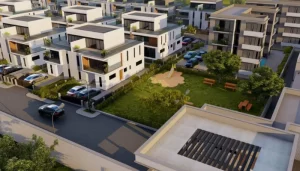
Nigeria’s real estate sector has shown resilience as its growth accelerated by 4.44 percent in the first quarter of this year amid rising building material costs and headwinds in the economy reflected in galloping inflation, high interest rate and volatile exchange rate.
The growth shows a significant increase when compared with the 2.26 percent it recorded in the last quarter of 2021 and 1.77 percent in Q1 2021.
This means that the sector still holds prospects for investors, but that is mostly for those of them with patient capital and long-term view of the market. It also means that investor confidence in the sector remains strong despite what experts describe as fragile recovery of the economy.
Experts have attributed the growth in the sector to increased activities, which, according to them, show investors have ignored the economy and high material costs to carry on with investment and developments.
In his monthly breakfast session at the Lagos Business School, Bismarck Rewane, CEO of Financial Derivatives Company, said spending on real estate assets would spike in the run-up to the general elections, describing the sector as a beneficiary of money laundering.
MKO Balogun, CEO of Global PFI, said growth in the sector resulted from the investment opportunities it offers, adding that it is about the only asset class that gives investors comfort at the moment.
Read also: Why real estate is soft target for investing laundered money
‘’The capital market is not doing well, and there are a lot of concerns around cryptocurrency and all these sway investment interest to real estate, which is also a low-risk asset,’’ Balogun said.
According to him, real estate has flexibility, which allows investors to buy and sell off when they want to.
He pointed out that growth also comes from changes in location and size of products, making it easy for young people to take them up, unlike in the past, when houses were in large sizes and were only taken up by the old and the rich. “There is also affordable rent now in the market and all these contributed to the growth we have seen,’’ Balogun said.
He said the positive movement in the sector is not about Nigeria alone. This aligns with Rewane’s projection that global real estate market will expand by 150 percent to $85.1 trillion over the next three years.
Rewane said Lagos, Nigeria’s commercial nerve centre, would continue to be the major driver of the Nigerian real estate investment landscape, adding, “Growing insecurity is fuelling demand for gated communities and Abuja residential assets while prices and sales value in leading cities for land and residential apartments have risen.’’
Galloping inflation in the country has changed commodity prices across the board, and in real estate, this has been made worse by other macro-economic issues such as high interest and exchange rates.
These have affected building material prices such that the average cost of a bag of cement in Nigeria is N4,200 for retail quantities and N3,800 for wholesale quantities (trailer load) or what is called off-depot price.
Across the country, building material prices have gone up considerably. In Lagos, for instance, a 50kg bag of Dangote brand of cement sells for N4,500 and that is the retail price. A 50kg bag of Lafarge Cement sells for N4,000 (retail price) while the wholes sale price of 600 bags is N2,275,000. The Ibeto brand of the product goes for N4,100 (retail price) while the wholesale price of 600 bags is N2,270,000.
In Imo State, Eugene Nweke, a construction engineer and developer, disclosed that building materials prices have gone up in the South East. “The cost of cement in Owerri is now N4,300,” he said.
“A lorry load of granite (30 tonnes), which sold for N240,000, is now sold for N350,000, which amounts to a 46 percent increase,” he added.
Livinus Nwankwo, a dealer in building materials in Zaria, Kaduna State, told BusinessDay that the increase in prices of building materials has multiplier effects on the industry, adding that many projects were being put on hold due to the cost of materials.
Read also: Why land banking is profitable real estate investment- experts
The implication of these developments is that affordable accommodation will remain elusive to the common man; besides, some developers might cleverly drift to using substandard materials just to survive the challenge.
Nwankwo said the cost of roofing sheet (020) had risen from N33,000 to N37,000 (12 percent) in a space of six months, while the price of iron-rod (12mm) moved from N4,200 to N4,700 (12 percent) within the same time frame,” he said.
The price of steel reinforcement bars, also known as Rebars, is a major source of concern in the building industry. From N275,000 per tonne in September 2020, the price rose to N345,000 per tonne in January/February this year and now goes for over N400,000 per tonne.






























